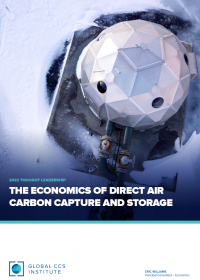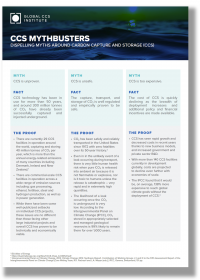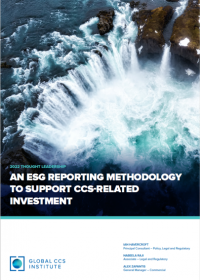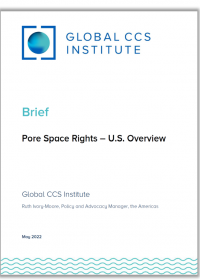リソース
刊行物、報告書および研究調査
検索条件
Read the Institute’s publication titled ‘CCS Milestones on the Road to COP28’, which uncovers international and national policy actions and discussions taken ahead of the 28th Conference of the Parties (COP28).
With COP28 being held from 30 November-12 December in the United Arab Emirates, carbon capture and storage (CCS) saw multilateral attention during the first half of 2023. However, improvements related to the coherence of CCS remain, particularly as opportunities to facilitate the deployment of the technology grows during this critical decade of action.
Authored by the Institute’s Senior International Climate Change Policy Adviser, Noora Al Amer, this report highlights and assesses a number of milestones reached ahead of COP28 as it relates to CCS, including:
- The release of the IPCC AR6 Synthesis Report, that marked CCS as an option to reduce emissions from industry. The report will support and inform the first Global Stocktake at the upcoming COP28.
- The latest political positioning on CCS issues, including through the Carbon Management Challenge and G7 and G20 activities
- The IEA’s Credible Pathways to 1.5°C Report, released in April 2023, which puts an emphasis on the need for CCS to tackle emissions from the energy sector
- The outcomes of the Bonn Climate Conference, where CCS was addressed formally in negotiation rooms
Opportunities to support and inform CCS and climate discussions at COP28 are ongoing for governments, industry players, ENGOs, civil society organisations and relevant stakeholders. Download the report today to get up to date on the latest details.
Disclaimer
The content within the Global CCS Institute Publications, Reports and Research Library is provided for information purposes only. We make every effort and take reasonable care to keep the content of this section up-to-date and error-free. However, we make no claim as to its accuracy, currency or reliability.
Content and material featured within this section of our website includes reports and research published by third parties. The content and material may include opinions and recommendations of third parties that do not reflect those held by the Global CCS Institute.
Read the Global CCS Institute’s latest thought leadership report, which evaluates the role of CCUS in supporting India’s climate ambitions, highlights the authorisation of India’s carbon credits trading scheme, and assesses the release of the Indian government’s detailed report on CCUS.
In 2022, India’s central government passed an amendment to the Energy Conservation Bill into law, marking a significant step for the set-up of a carbon trading system in India. The NITI Aayog, an Indian central governmental think tank, also released a policy framework paper in 2022 on CCUS that acknowledged the role of CCUS in decarbonisation and the development of a low-carbon economy.
These developments, together with the government’s announcement to establish two National Centres of Excellence in Carbon Capture and Utilization, demonstrates India’s intention to fill in the blanks on the components needed for viable domestic emissions reduction pathways.
Titled ‘India’s Carbon Credit Trading Scheme & the Indian Government’s CCUS Report,’ this publication is the second report in an Institute series analysing India’s climate ambitions.
This report provides readers with an overview on:
- The impact and significance of the establishment of a national carbon credit trading scheme, as it relates to domestic companies seeking to reduce emissions
- The growing drive by India’s government to better understand CCUS technology and build opportunities for further research, development and collaboration
- Climate ambition and leadership in the country, including India’s G20 presidency, a brief overview of the country’s emissions reduction commitments, and updates to India’s Nationally Determined Contributions (NDCs) submitted to the UNFCCC
Disclaimer
The content within the Global CCS Institute Publications, Reports and Research Library is provided for information purposes only. We make every effort and take reasonable care to keep the content of this section up-to-date and error-free. However, we make no claim as to its accuracy, currency or reliability.
Content and material featured within this section of our website includes reports and research published by third parties. The content and material may include opinions and recommendations of third parties that do not reflect those held by the Global CCS Institute.
「世界のCCSの動向 2022年版」(日本語)を、公開いたします。
こちらは「Gloal Status of CCS 2022」の邦訳です。
→ 英語版
→ アラビア語
Disclaimer
The content within the Global CCS Institute Publications, Reports and Research Library is provided for information purposes only. We make every effort and take reasonable care to keep the content of this section up-to-date and error-free. However, we make no claim as to its accuracy, currency or reliability.
Content and material featured within this section of our website includes reports and research published by third parties. The content and material may include opinions and recommendations of third parties that do not reflect those held by the Global CCS Institute.
Carbon capture and storage (CCS) is a set of technologies that capture CO2 from large emission sources or from the atmosphere and safely stores it underground or permanently in products. As the scale and urgency of climate action has become clearer in recent years and governments and companies have done the necessary work to map their own pathways to climate neutrality, carbon dioxide removal (CDR) technologies - direct air carbon capture and storage (DACCS) in particular - have become a focal point in climate mitigation.
This paper explores the economics of DACCS, relying on the economic model described in the methodology, in which actors within the energy system are free to pursue least-cost options in meeting net-zero pathways. The intent of the paper is a thought experiment to show how DACCS deployment might affect the global energy system. It focuses solely on the cost of DACCS - applying no additional policy assumptions - and is not a forecast.
The paper finds that:
- DACCS plays a unique role among technological climate mitigation options as it can function as a backstop technology, potentially avoiding climate disaster if other low-cost pathways are not realised.
- Low-cost DACCS, should it be realised, would reduce the total cost of decarbonisation and meeting climate goals.
- If DACCS deployment is limited due to high costs, the main decarbonisation pathway for industry and transport (except light duty vehicles, which are electrified) is hydrogen.
- Electricity generation, buildings, and light vehicles are largely unaffected by the deployment of DACCS and decarbonise through increased efficinecy and renewable energy pathways.
- The challenge inherent for governments is to implement policy and provide incentives for immediately available mitigation pathways, while supporting the development and commercialisation of lower-cost DACCS.
Download a description of the economic model used in this paper here.
Disclaimer
The content within the Global CCS Institute Publications, Reports and Research Library is provided for information purposes only. We make every effort and take reasonable care to keep the content of this section up-to-date and error-free. However, we make no claim as to its accuracy, currency or reliability.
Content and material featured within this section of our website includes reports and research published by third parties. The content and material may include opinions and recommendations of third parties that do not reflect those held by the Global CCS Institute.
2022年6月6日から16日にかけて開催された第56回補助機関ボン気候変動会議では、2022年11月に開催される国連気候変動会議(COP27)に向けて、すべての締約国が集まり、前進を遂げました。
インスティテュートは、オブザーバーとしてボンの会合に立ち会い、交渉プロセスをフォローし、適切な場での議論に参加し、各国代表者や参加者と連絡を取り合いました。
本ブリーフでは、パリ協定のグローバルストックテイク(GST)や第6条交渉など、CCSに最も関連する分野で行われた主要な議論に焦点を当て、今回の会議での主な成果について概説しています。
ボンでの気候変動交渉の成果
CCSに関する考察
COP27に向けた次のステップ
本書は、インスティテュートの国際気候変動担当上級政策アドバイザーであるNoora Al Amerが執筆したもので、COP27とパリ協定の実施におけるCCSの役割に関する書籍シリーズの第一弾となります。
以上
Disclaimer
The content within the Global CCS Institute Publications, Reports and Research Library is provided for information purposes only. We make every effort and take reasonable care to keep the content of this section up-to-date and error-free. However, we make no claim as to its accuracy, currency or reliability.
Content and material featured within this section of our website includes reports and research published by third parties. The content and material may include opinions and recommendations of third parties that do not reflect those held by the Global CCS Institute.
CCSの加速的な展開は、気候変動を減速させ、ネット・ゼロへの移行を実現するための解決策においての重要な一つである。しかし、世間にはまだCCSに関する誤った情報が多くある。
グローバルCCSインスティテュートのこの新しい2ページでは、CCSに関する最も一般的な5つの神話に取り組んでいる。
- CCSは実証されていない技術である
- CCSのコストは高すぎる
- CO2貯留は安全でない
- CCSは化石燃料産業を延命させ、世界の気候変動目標の達成を遅らせるだけである。
- CCSプロジェクトで回収されたすべてのCO2を安全に貯留するための十分な場所はない。
IEAやIPCC、その他の信頼できる学術団体による最新の研究結果を参照しながら、これらの神話に対する証拠の詳細について学ぶには、本ファクトシートをご参照ください。
ダウンロード:リンク
Disclaimer
The content within the Global CCS Institute Publications, Reports and Research Library is provided for information purposes only. We make every effort and take reasonable care to keep the content of this section up-to-date and error-free. However, we make no claim as to its accuracy, currency or reliability.
Content and material featured within this section of our website includes reports and research published by third parties. The content and material may include opinions and recommendations of third parties that do not reflect those held by the Global CCS Institute.
The ESG reporting landscape remains dynamic and there is an increasingly clear opportunity for both project proponents and investors to leverage ESG frameworks for the deployment of CCS in pursuit of decarbonisation. However, while there are few barriers to reporting CCS-specific activities within an organisation’s climate risk mitigation activities, questions remain about the quality and utility of this information.
This thought leadership report from the Institute builds upon previous analysis, to consider in greater detail how project proponents and investors may leverage the benefits of their CCS-related investments and project operations, in the context of the wider reporting environment. The Institute has developed a CCS-specific methodology, highlighting potential pathways for the reporting of CCS activities within current ESG schemes and reporting regimes. This non-prescriptive approach aligns with the six high-level themes identified within leading existing schemes and is in-line with feedback received from a variety of stakeholders on consolidation and harmonisation.
ダウンロード:リンク
Disclaimer
The content within the Global CCS Institute Publications, Reports and Research Library is provided for information purposes only. We make every effort and take reasonable care to keep the content of this section up-to-date and error-free. However, we make no claim as to its accuracy, currency or reliability.
Content and material featured within this section of our website includes reports and research published by third parties. The content and material may include opinions and recommendations of third parties that do not reflect those held by the Global CCS Institute.
「世界のCCSの動向 2021年版」(日本語)を、公開いたします。
こちらは「Gloal Status of CCS 2021」の邦訳です。
(英語、日本語訳以外にも、中国語、アラビア語訳が閲覧可能)
ダウンロード
→ 英語版
→ アラビア語訳
Disclaimer
The content within the Global CCS Institute Publications, Reports and Research Library is provided for information purposes only. We make every effort and take reasonable care to keep the content of this section up-to-date and error-free. However, we make no claim as to its accuracy, currency or reliability.
Content and material featured within this section of our website includes reports and research published by third parties. The content and material may include opinions and recommendations of third parties that do not reflect those held by the Global CCS Institute.
米国における二酸化炭素(CO2)の地層貯留は、間隙の所有権というユニークな財産法の問題を提起しています。
本報告書は、アメリカ地域担当の政策アドボカシーマネージャーのRuth Ivory-Mooreが執筆し、米国内の間隙水所有権の問題を要約し、19の異なる州における孔隙の所有権に関する財産権法の現状を簡単に説明しています。
ダウンロード:リンク
Disclaimer
The content within the Global CCS Institute Publications, Reports and Research Library is provided for information purposes only. We make every effort and take reasonable care to keep the content of this section up-to-date and error-free. However, we make no claim as to its accuracy, currency or reliability.
Content and material featured within this section of our website includes reports and research published by third parties. The content and material may include opinions and recommendations of third parties that do not reflect those held by the Global CCS Institute.
With the emergence of Carbon Capture and Storage as an essential tool to limit climate change impact and reduce emissions from energy intensive industries, interest in CCS has been growing at an unprecedented rate in recent years.
As a result of the key role played by CCS in the energy transition towards a net-zero future, the economic performance of CCS is becoming increasingly important and technology development fundamental to meet the demand for improved CO2 capture systems, transport costs and storage options.
In our inaugural Technology Compendium, authored by Dr. Nouman Mirza and Dr. David Kearns, we take a look at a wide range of commercially-available CCS technologies around the world and analyse technology developments in the context of CO2 capture, transport, storage and the full value chain.
ダウンロード:リンク
Disclaimer
The content within the Global CCS Institute Publications, Reports and Research Library is provided for information purposes only. We make every effort and take reasonable care to keep the content of this section up-to-date and error-free. However, we make no claim as to its accuracy, currency or reliability.
Content and material featured within this section of our website includes reports and research published by third parties. The content and material may include opinions and recommendations of third parties that do not reflect those held by the Global CCS Institute.
Developments and Opportunities – A Review of National Responses to CCS Under the London Protocol
4th May 2022
In a perspective released by the Institute, authors Ian Havercroft and Chris Consoli explain how amendments to the London Protocol has enhanced prospects to scale up CCS. With greater flexibility under the London Protocol, including transboundary movement of CO2 aimed for storage now permitted, this perspective looks at how nations in Europe and Asia Pacific are responding to potential CCS opportunities provided with lessened regulatory barriers.
Disclaimer
The content within the Global CCS Institute Publications, Reports and Research Library is provided for information purposes only. We make every effort and take reasonable care to keep the content of this section up-to-date and error-free. However, we make no claim as to its accuracy, currency or reliability.
Content and material featured within this section of our website includes reports and research published by third parties. The content and material may include opinions and recommendations of third parties that do not reflect those held by the Global CCS Institute.
In a report released by the UN International Panel on Climate Change (IPCC) titled ‘Mitigation of Climate Change’, authors – part of Working Group III – pointed to the critical role carbon capture and storage (CCS) will play as a climate solution, on the urgent path to limit global warming.
The Institute takes a closer look at this key IPCC report in a newly released brief, authored by our Senior Policy Adviser on International Climate Change, Noora Al Amer. In it, the Institute unpacks the details of the IPCC findings, highlighting:
- The emissions mitigation potential CCS will provide a wide range of sectors, further supporting pathways to net-zero
- Where CCS stands on the UN’s Sustainable Development Goals
- How scaling CCS deployment can vary based on region
Download the brief below for the full overview.
Disclaimer
The content within the Global CCS Institute Publications, Reports and Research Library is provided for information purposes only. We make every effort and take reasonable care to keep the content of this section up-to-date and error-free. However, we make no claim as to its accuracy, currency or reliability.
Content and material featured within this section of our website includes reports and research published by third parties. The content and material may include opinions and recommendations of third parties that do not reflect those held by the Global CCS Institute.








